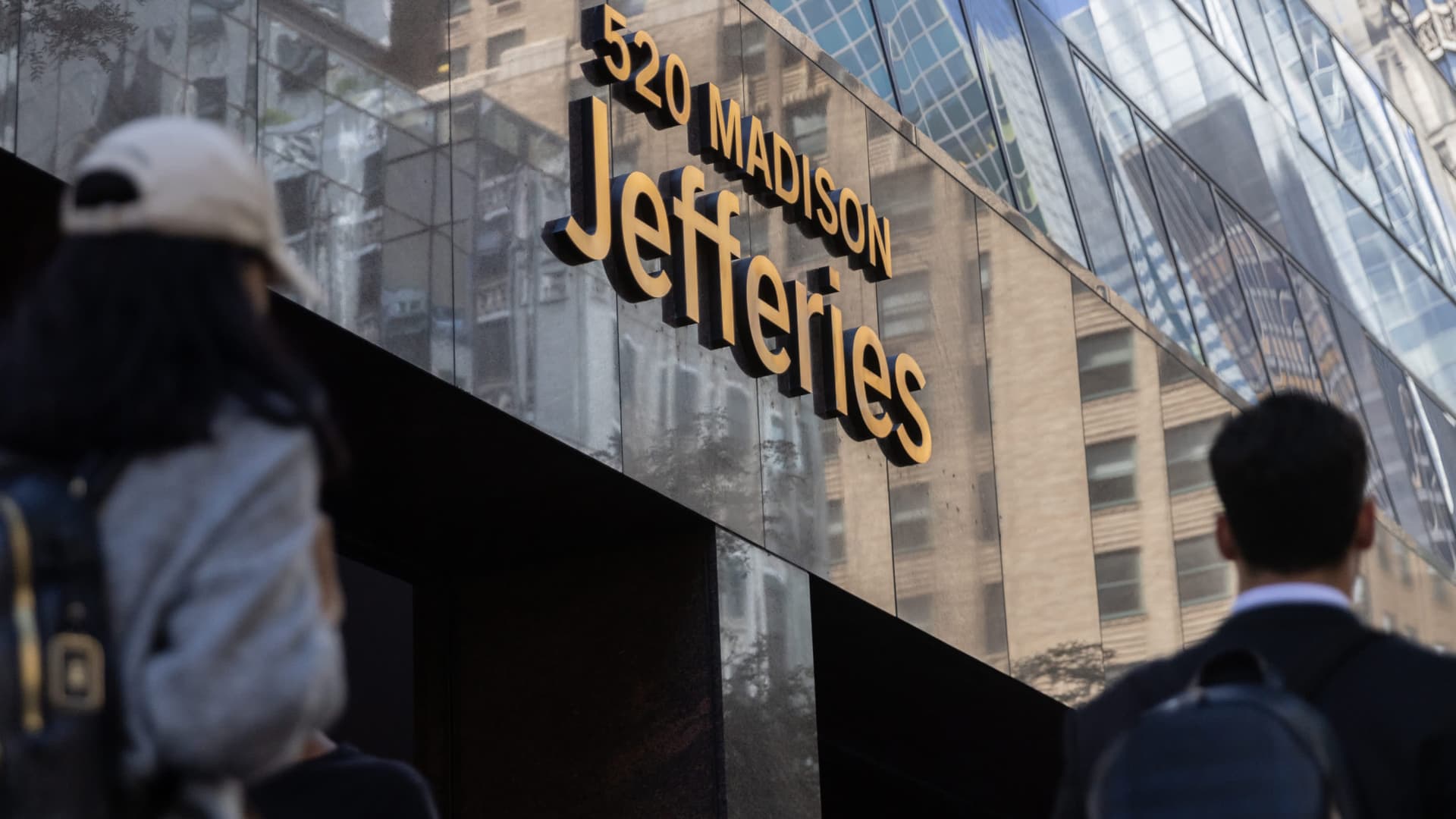Jefferies headquarters in New York, US, on Wednesday, Aug. 23, 2023.
Jeenah Moon | Bloomberg | Getty Images

ZION and KRE, 1-day
The bankruptcies of two auto industry-related companies this year have raised concerns about loose lending practices, especially in the opaque private credit market. That’s left both the banking industry and investors concerned about whether instances of loans gone wrong indicate a burgeoning crisis.
The latest signs of trouble came when Zions said Wednesday evening it faced a sizable charge because of bad loans to a couple of borrowers. Despite expecting this was an isolated incident, the bank said that it will encourage its counsel to have an independent review.
Western Alliance then alleged Thursday a borrower had committed fraud. That rattled investors despite the company saying it could reaffirm its guidance and 2025 outlook.
“While we are questioning why all of these credit ‘one offs’ are seemingly occurring in a short period of time, the reality is that even though these exposures may be ‘well-contained’ and have a ‘limited financial impact,’ this is an industry where investors — especially those that are new to this sector — tend to ‘sell first and ask questions later,’ especially when it comes to elevated credit concerns,” JPMorgan banking analyst Anthony Elian wrote in a Thursday note to clients.
Looking for ‘cockroaches’
The worries about the health of the banking industry originated with the bankruptcies of companies related to the auto sector: First Brands and Tricolor Holdings.
Auto parts maker First Brands went bankrupt last month and announced this week that founder Patrick James stepped down as chief executive. The Ohio-based company is facing a Justice Department criminal investigation, the Wall Street Journal reported, citing people familiar with the matter.
Shares of Jefferies, which has exposure to First Brands, fell more than 9% on Thursday. The investment bank’s stock has lost around 23% in October, making it poised to record its worst month since the Covid pandemic took hold in March 2020.
Jefferies said that hedge funds it runs are owed $715 million from companies tied to First Brands, while UBS said that it has about $500 million in exposure.
“When you see one cockroach, there are probably more,” JPMorgan CEO Jamie Dimon said on the company’s earnings conference call earlier this week in relation to First Brands and Tricolor Holdings fallout.

JEF, 1-month
JPMorgan did not have exposure to First Brands, but did take a $170 million charge-off last quarter from Tricolor.
“I asked Jamie Dimon the question about these problems, and you heard, when you see one cockroach, there’s probably a few more,” said Mike Mayo, senior banking analyst at Wells Fargo. “Investors are looking around for cockroaches. That’s what’s happening.”
An ‘opaque’ market
Mayo said credit quality in the overall industry is still considered favorable. However, he said the recent developments show the low margin for error when there’s hiccups in the credit market.
Additionally, because the private credit market is so “opaque,” there can be a “major wave of concern without really knowing if there is even a problem,” said Peter Corey of Pave Finance.
This week’s lending revelations mark the latest challenge in recent years for regional banks. The industry went through a crisis in 2023 that began with the collapse of Silicon Valley Bank.
Alternative and other asset managers also suffered in the Thursday downdraft resulting from concern about the health of some loans.
Blue Owl Capital dropped nearly 4%, while Ares Management and Blackstone each fell more than 3%. Apollo Global Management weakened by almost 3% and Carlyle Group declined more than 2%.
To be sure, the declines in major banks was subdued Thursday. JPMorgan fell only about 1%. Bank of America was 2% lower.
A bull market in stocks and the booming private credit market this year has calmed investors nerves about whether there is a systemic crisis emerging. The stock market Thursday appeared to be dragged lower by the decline in regional banks, but stabilized later in the day with the S&P 500 only seeing minor losses.
“Today, I think, the risk to the bank space is idiosyncratic,” said Timothy Coffey, associate director of depository research at Janney Montgomery Scott. “The risk to the insured bank space for private credit could be more systemic, as well as the risk to credit quality from a weakening economy.”
— CNBC’s Hugh Son, John Melloy and Scott Schnipper contributed to this report.





